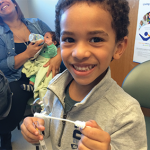 ACR CONVERGENCE 2021—The Edmund L. Dubois, MD, Memorial Lectureship was established by the Rheumatology Research Foundation to honor an outstanding investigator in the field of lupus. This year’s honoree was Aimee Hersh, MD, an associate professor and division chief of pediatric rheumatology at the University of Utah, Salt Lake City. Dr. Hersh’s research focuses on understanding long-term outcomes in patients with childhood-onset systemic lupus erythematosus (SLE). For this lectureship, she discussed her work on defining research priorities in pediatric lupus.
ACR CONVERGENCE 2021—The Edmund L. Dubois, MD, Memorial Lectureship was established by the Rheumatology Research Foundation to honor an outstanding investigator in the field of lupus. This year’s honoree was Aimee Hersh, MD, an associate professor and division chief of pediatric rheumatology at the University of Utah, Salt Lake City. Dr. Hersh’s research focuses on understanding long-term outcomes in patients with childhood-onset systemic lupus erythematosus (SLE). For this lectureship, she discussed her work on defining research priorities in pediatric lupus.
Dr. Hersh opened with an overview of the epidemiology, natural course and unique challenges of childhood-onset SLE. Pediatric lupus affects up to an estimated 10,000 children and adolescents in the U.S., and about one-fifth of all SLE patients are diagnosed prior to 18 years of age. Pediatric lupus also disproportionately affects Black and Hispanic populations.
Unique Challenges of Childhood-Onset SLE
Compared with adult-onset SLE, children with SLE have higher rates of organ disease, and it is estimated that up to 80% will develop lupus nephritis. Pediatric patients also run the risk of increased morbidity and mortality.1 Despite these challenges, management of pediatric SLE is mostly extrapolated from adult studies, and pediatric studies are limited. To date, only one medication has been approved by the U.S. Food & Drug Administration for the treatment of children with lupus, belimumab.
Dr. Hersh then took a moment to consider some of the aspects that make pediatric SLE unique, and she posed several questions: “Why do children get lupus? Does it have to do with genetics and epigenetics? Environmental factors? Adverse childhood events?” She explained that pediatric rheumatologists spend a lot of time considering how a lupus diagnosis may impact a child’s developmental and mental health, as well as how treatment adherence can influence disease course and outcome.
She then addressed some unique aspects to consider regarding outcomes in pediatric lupus. “We know that a child who is diagnosed with lupus will be exposed to the disease and the treatment over their lifetime,” Dr. Hersh explained as she highlighted that these patients seem to be at risk for certain complications, such as earlier renal failure, premature cardiovascular disease, skeletal deficits and psychosocial impairments. Although less is known about specific outcomes for infertility, cancer and early mortality, these are also significant concerns.
The process of transitioning care from pediatric to adult providers poses another challenge in the assessment of long-term outcomes in childhood-onset SLE. Many rheumatology professionals recognize this as a vulnerable time for patients who may be lost to clinical follow-up, and this also creates unique challenges in the assessment of long-term research outcomes, she explained.



